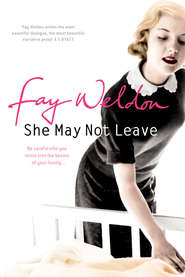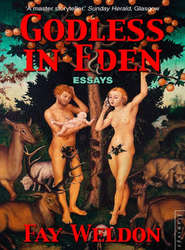По всем вопросам обращайтесь на: info@litportal.ru
(©) 2003-2024.
✖
What Makes Women Happy
Автор
Год написания книги
2018
Настройки чтения
Размер шрифта
Высота строк
Поля
Porn excites to sex, sure. Sex incited by porn is not bad, just different. Tomorrow’s sex is always going to be different from today’s. In a long-term partnership there is room and time for all kinds. Sex can be tender, loving, companionable, a token of closeness and respect, the kind women claim to like. Then it’s romantic, intimate, and smacks of permanence. Sometimes sex is a matter of lust, release, excitement, anger, and the sense is that any woman could inspire it. It’s macho, anti-domestic. Exciting. Don’t resist the mood – try and match it. Tomorrow something else will surface more to your liking. Each sexual act will have a different feel to it, the two instincts in both of you being in variable proportions from night to night, week to week, year to year. It’s rare for a couple’s sexual energies to be exactly matched. But lucky old you if they are.
I have friends so anxious that they can’t let the man in their life out of their sight in case he runs off with someone else. It’s counter-productive. Some girls just do stop traffic in the street. So it’s not you – so what? Men like looking at pretty girls in the street not because they long to sleep with them, or because given a choice between them and you they’d choose them, but because it’s the instinct of the cave asserting itself. Pretty girls are there to be looked at speculatively by men and, if they have any sense, with generous appreciation by women. It’s bad manners in men, I grant you, to do it too openly, especially if the woman objects, but not much worse than that.
This will not be enough, I know, to convince some women that for a husband or lover to watch porn is not a matter for shock-horror. But look at it like this. A newborn baby comes into the world with two urgent appetites: one is to feed, the other is to suck. Because the nipple is there to satisfy both appetites, the feeding/sucking distinction gets blurred for both mother and baby. If you are lucky, the baby’s time at the breast or bottle is time enough to satisfy the sucking instinct. If you’re not lucky, the baby, though fed to completion, cries, chafes and vomits yet goes on sucking desperately, as if it were monstrously hungry. At which point the wise mother goes to fetch a dummy, so everyone can get some peace. Then baby can suck, digest and sleep, all at the same time, blissfully. (Most babies simply toss the dummy out of the cot as soon as they’re on solids and the sucking reflex fades, thus sparing the mother social disgrace.)
In the same way, in males, the instinct for love and the need for sexual gratification overlap but do not necessarily coincide. The capacity for love seems inborn; lust weighs in powerfully at puberty. The penis is there to satisfy both appetites. If you are lucky, the needs coincide in acts of domestic love; if you are not, your man’s head turns automatically when a pretty girl passes in the street, or he goes to the porn channels on the computer. He is not to be blamed. Nor does it affect his relationship with you. Love is satisfied, sex isn’t quite. He clutches the dummy.
An Unreliable Narrator
Bear in mind, of course, that you must take your instruction from a very flawed person. She wouldn’t want to make you anxious by being perfect. Your writer spent last night in the spare room following a domestic row. Voices were raised, someone broke a glass, she broke the washing machine by trying to wrench open the door while it was in the middle of its spin cycle.
Domestic rows do not denote domestic unhappiness. They do suggest a certain volatility in a relationship. Sense might suggest that if the morning wakes to the lonely heaviness that denotes a row the night before, you have no business describing your marriage as ‘happy’. But sense and experience also suggest that you have made your own contribution to the way you now feel. And the early sun beats in the windows and it seems an insult to your maker to maintain a grudge when the morning is so glorious.
You hear the sound of the vacuum cleaner downstairs. Soon it will be safe to go down and have a companionable breakfast without even putting on your shoes for fear of slivers of broken glass. Storms pass, the sun shines again. Yes, you are happy.
What the quarrel was about I cannot for the life of me remember.
Except of course now the washing machine doesn’t work. When it comes to domestic machinery, retribution comes fast. In other areas of life it may come slowly. But it always does come, in terms of lost happiness, in distance from heaven, in the non-appearance of angels.
And since this book comes to your writer through the luminiferous aether, that notoriously flimsy and deceptive substance, Victorian equivalent of the dark matter of which scientists now claim the universe is composed, what is said is open to interpretation. It is not the Law.
Why, Why?
Like it or not, we are an animal species. Darwinian principles apply. We have evolved into what we are today. We did not spring ready-made into the twenty-first century. The human female is born and bred to select a mate, have babies, nurture them and, having completed this task, die. That is why we adorn ourselves, sweep the cave, attract the best man we can, spite unsuccessful lovers, fall in love and keep a man at our side as long as we can. We are hardwired to do it, for the sake of our children.
Whether a woman wants babies or not, whether she has them or not, is irrelevant. Her physiology and her emotions behave as if she does. Her hormones are all set up to make her behave like a female member of the tribe. The female brain differs from the male even in appearance. Pathologists can tell which is which just by looking,
(Of course if a woman doesn’t want to put up with her female destiny she can take testosterone in adult life and feel and be more like a man. Though it is better, I feel, to work with what you have. And that early foetal drenching in oestrogen, when the female foetus decides at around eight weeks that female is the way it’s going to stay, is pretty final.)
In her young and fecund years a woman must call upon science and technology, or great self-control, in order not to get pregnant. As we grow older, as nurture gains more power over nature, it becomes easier to avoid it. A: We are less fertile. B: We use our common sense. The marvel is that there are so few teenage pregnancies, not so many.
To fall in love is to succumb to instinct. Common sense may tell us it’s a daft thing to do. Still we do it. We can’t help it, most of us, once or twice in a lifetime. Oestrogen levels soar, serotonin plummets. Nature means us to procreate.
(Odd, the fall in serotonin symptomatic of falling in love. Serotonin, found in chocolate, makes us placid and receptive. A serotonin drop make us anxious, eager, sexy and on our toes. Without serotonin, perhaps, we are more effective in courtship.)
Following the instructions of the blueprint for courtship, the male of the human species open doors for us, bring us gifts and forages for us. If he fails to provide, we get furious, even when we ourselves are the bigger money earners. We batter on the doors of the CSA. It’s beyond all reason. It is also, alas, part of the male impulse to leave the family as soon as the unit can survive without him and go off and create another. (Now that so many women can get by perfectly well without men, the surprise is that men stay around at all.)
The tribe exercises restraint upon the excesses of the individual, however, and so we end up with marriage, divorce laws, sexual-harassment suits and child support. The object of our erotic attention also has to conform to current practices, no matter what instinct says. ‘Under 16? Too bad!’ ‘Your pupil? Bad luck!’ Nature says, ‘Kill the robber, the interloper.’ Nurture says, ‘No, call the police.’ The sanction, the disapproval of the tribe, is very powerful. Exile is the worst fate of all. Without the protection of the tribe, you die.
Creatures of the Tribe
We do not define ourselves by our animal nature. We are more than creatures of a certain species. We are moral beings. We are ingenious and inquisitive, have intelligence, self-control and spirituality. We understand health and hormones. We develop technology to make our lives easier. We live far longer, thanks to medical science, than nature, left to its own devices, would have us do. We build complicated societies. Many of us choose not have babies, despite our bodies’ instinctive craving for them. We socialize men not to desert us; we also, these days, socialize ourselves not to need them.
‘I don’t dress to attract men,’ women will say. ‘I dress to please myself.’ But the pleasure women have in the candlelit bath before the party, the arranging and rearranging of the hair, the elbowing of other women at the half-price sale, is instinctive. It’s an overflow from courting behaviour. It’s also competitive, whether we admit it or not. ‘I am going to get the best man. Watch out, keep off!’
To make friends is instinctive. We stick to our age groups. We cluster with the like-minded. That way lies the survival of the tribe. A woman needs friends to help her deliver the baby, to stand watch when the man’s away. But she must also be careful: other women can steal your alpha male and leave you with a beta.
See in shopping, source of such pleasure, also the intimidation of rivals. ‘My Prada handbag so outdoes yours – crawl away!’ And she will, snarling.
And if her man’s genes seem a better bet than your man’s, nab him. Nature has no morality.
Any good feminist would dismiss all this as ‘biologism’ – the suggestion that women are helpless in the face of their physiology. Of course we are not, but there’s no use denying it’s at the root of a great deal of our behaviour, and indeed of our miseries. When instincts conflict with each other, when instinct conflicts with socialization, when nature and nurture pull us different ways, that’s when the trouble starts.
‘I want another éclair.’
Agony.
Well, take the easy way out. Say to yourself, ‘One’s fine, two’s not.’ No one’s asking for perfection. And anxiety is inevitable.
A parable.
Once Bitten, Twice Shy
Picture the scene. It’s Friday night. David and Letty are round at Henry and Mara’s place, as is often the case, sharing a meal. They’re all young professionals in their late twenties, good-looking and lively as such people are. They’ve unfrozen the fish cakes, thawed the block of spinach and cream, and Henry has actually cleaned and boiled organic potatoes. After that it’s cheese, biscuits and grapes. Nothing nicer. And Mara has recently bought a proper dinner set so the plates all match.
They all met at college. Now they live near each other. They’re not married, they’re partnered. But they expect and have so far received fidelity. They have all even made quasi-nuptial contracts with their partner, so should there be a split the property can be justly and fairly assigned. All agree the secret of successful relationships is total honesty.
After graduation Henry and Mara took jobs with the same city firm so as to be together. Mara is turning out to be quite a highflyer. She earns more than Henry does. That’s okay. She’s bought herself a little Porsche, buzzes around. That’s fine.
‘Now I can junk up the Fiesta with auto mags, gum wrappers and Coke tins without Mara interfering,’ says Henry.
Letty and David work for the same NHS hospital. She’s a radiographer; he is a medical statistician. Letty is likely to stay in her job, or one like it, until retirement, gradually working her way up the promotional ladder, such is her temperament. David is more flamboyant. He’s been offered a job at New Scientist. He’ll probably take it.
Letty would like to get pregnant, but they’re having difficulty and Letty thinks perhaps David doesn’t really want a baby, which is why it isn’t happening.
Letty does have a small secret from David. She consults a psychic, Leah, on Friday afternoons when she leaves work an hour earlier than on other days. She doesn’t tell David because she thinks he’d laugh.
‘I see you surrounded by babies,’ says Leah one day, after a leisurely gaze into her crystal ball.
‘Fat chance,’ says Letty.
‘Is your husband a tall fair man?’ asks Leah.
‘He isn’t my husband, he’s my partner,’ says Letty crossly, ‘and actually he’s rather short and dark.’
Leah looks puzzled and changes the subject.
But that was a couple of weeks back. This is now. Two bottles of Chilean wine with the dinner, a twist of weed which someone gave Mara for a birthday present…and which they’re not sure they’ll use. They’re happy enough as they are. Medical statisticians, in any case, do not favour the use of marijuana.
Henry owns a single e, which someone for reasons unknown gave him when Mara bought the Porsche, saying happiness is e-shaped. He keeps it in his wallet as a kind of curiosity, a challenge to fate.
‘You’re crazy,’ says Letty, when he brings it out to show them. ‘Suppose the police stopped you? You could go to prison.’
‘I don’t think it’s illegal to possess a single tablet,’ says David. ‘Only to sell them.’
He is probably right. Nobody knows for sure. Henry puts it away. It’s gone kind of greyish and dusty from too much handling, anyway, and so much observation. Ecstasy is what other people do.
Mara’s mobile sings ‘Il Toreador’. Mara’s mother has been taken ill at home in Cheshire. It sounds as if she might have had a stroke. She’s only 58. The ambulance is on its way. Mara, who loves her mother dearly, decides she must drive north to be there for her. No, Mara insists, Henry isn’t to come with her. He must stay behind to hold the fort, clear the dinner, make apologies at work on Monday if it’s bad and Mara can’t get in. ‘You’d only be in the way,’ she adds. ‘You know what men are like in hospitals.’ That’s how Mara is: decisive. And now she’s on her way, thrum, thrum, out of their lives, in the Porsche.











